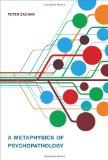March 25, 2014

A Metaphysics of Psychopathology by Peter Zachar (MIT Press, 2014)
(kindle ed.), (amazon.co.uk), (UK kindle ed.)
Book description from the publisher:
In psychiatry, few question the legitimacy of asking whether a given psychiatric disorder is real; similarly, in psychology, scholars debate the reality of such theoretical entities as general intelligence, superegos, and personality traits. And yet in both disciplines, little thought is given to what is meant by the rather abstract philosophical concept of “real.” Indeed, certain psychiatric disorders have passed from real to imaginary (as in the case of multiple personality disorder) and from imaginary to real (as in the case of post-traumatic stress disorder). In this book, Peter Zachar considers such terms as “real” and “reality” — invoked in psychiatry but often obscure and remote from their instances — as abstract philosophical concepts. He then examines the implications of his approach for psychiatric classification and psychopathology. Proposing what he calls a scientifically inspired pragmatism, Zachar considers such topics as the essentialist bias, diagnostic literalism, and the concepts of natural kind and social construct. Turning explicitly to psychiatric topics, he proposes a new model for the domain of psychiatric disorders, the imperfect community model, which avoids both relativism and essentialism. He uses this model to understand such recent controversies as the attempt to eliminate narcissistic personality disorder from the DSM-5. Returning to such concepts as real, true, and objective, Zachar argues that not only should we use these metaphysical concepts to think philosophically about other concepts, we should think philosophically about them.
Google Books preview:
Comments (0)
- new books,philosophy of mind,psychology,reality
March 23, 2014

The Proust Effect: The Senses as Doorways to Lost Memories by Cretien van Campen (Oxford University Press, USA, 2014)
(kindle ed.), (amazon.co.uk), (UK kindle ed.)
Book description from the publisher:
The senses can be powerful triggers for memories of our past, eliciting a range of both positive and negative emotions. The smell or taste of a long forgotten sweet can stimulate a rich emotional response connected to our childhood, or a piece of music transport us back to our adolescence. Sense memories can be linked to all the senses – sound, vision, and even touch can also trigger intense and emotional memories of our past.
In The Proust Effect, we learn about why sense memories are special, how they work in the brain, how they can enrich our daily life, and even how they can help those suffering from problems involving memory. A sense memory can be evoked by a smell, a taste, a flavour, a touch, a sound, a melody, a colour or a picture, or by some other involuntary sensory stimulus. Any of these can triggers a vivid, emotional reliving of a forgotten event in the past.
Exploring the senses in thought-provoking scientific experiments and artistic projects, this fascinating book offers new insights into memory – drawn from neuroscience, the arts, and professions such as education, elderly care, health care therapy and the culinary profession.
Google Books preview:
See also: Author’s website
Comments (0)
- cognitive science,new books
March 22, 2014

Morality for Humans: Ethical Understanding from the Perspective of Cognitive Science by Mark Johnson (University of Chicago Press, 2014)
(kindle ed.), (amazon.co.uk), (UK kindle ed.)
Book description from the publisher:
What is the difference between right and wrong? This is no easy question to answer, yet we constantly try to make it so, frequently appealing to some hidden cache of cut-and-dried absolutes, whether drawn from God, universal reason, or societal authority. Combining cognitive science with a pragmatist philosophical framework in Morality for Humans: Ethical Understanding from the Perspective of Cognitive Science, Mark Johnson argues that appealing solely to absolute principles and values is not only scientifically unsound but even morally suspect. He shows that the standards for the kinds of people we should be and how we should treat one another—which we often think of as universal—are in fact frequently subject to change. And we should be okay with that. Taking context into consideration, he offers a remarkably nuanced, naturalistic view of ethics that sees us creatively adapt our standards according to given needs, emerging problems, and social interactions.
Ethical naturalism is not just a revamped form of relativism. Indeed, Johnson attempts to overcome the absolutist-versus-relativist impasse that has been one of the most intractable problems in the history of philosophy. He does so through a careful and inclusive look at the many ways we reason about right and wrong. Much of our moral thought, he shows, is automatic and intuitive, gut feelings that we follow up and attempt to justify with rational analysis and argument. However, good moral deliberation is not limited merely to intuitive judgments supported after the fact by reasoning. Johnson points out a crucial third element: we imagine how our decisions will play out, how we or the world would change with each action we might take. Plumbing this imaginative dimension of moral reasoning, he provides a psychologically sophisticated view of moral problem solving, one perfectly suited for the embodied, culturally embedded, and ever-developing human creatures that we are.
Google Books preview:
See also: Author’s webpage
Comments (0)
- cognitive science,new books
March 20, 2014

Hacking Happiness: Why Your Personal Data Counts and How Tracking it Can Change the World by John Havens (Tarcher, 2014)
(kindle ed.), (amazon.co.uk), (UK kindle ed.)
Book description from the publisher:
In Hacking Happiness, futurist and contributing Mashable writer John C. Havens introduces you to your “quantified self”—your digital identity represented by gigabytes of data produced from tracking your activities on your smartphone and computer. Harvested by megacorporations such as Google, Facebook, and Amazon, Havens argues that companies gather this data because of its immense economic value, encouraging a culture of “sharing” as they hoard the information based on our lives for private monetary gain.
But there’s an alternative to this digital dystopia. Emerging technologies will help us reclaim this valuable data for ourselves, so we can directly profit from the insights linked to our quantified selves. At the same time, sensors in smartphones and wearable devices will help us track our emotions to improve our well-being based on the science of positive psychology. Havens proposes that these trends will lead to new economic policies that redefine the meaning of “wealth,” allowing governments to create policy focused on purpose rather than productivity.
An issues book highlighting the benefits of an examined life in the digital world, this timely work takes the trepidation out of the technological renaissance and illustrates how the fruits of the Information Age can improve our lives for a happier humanity.
See also: Excerpt (Introduction, pdf), Author’s website
Comments (0)
- happiness






